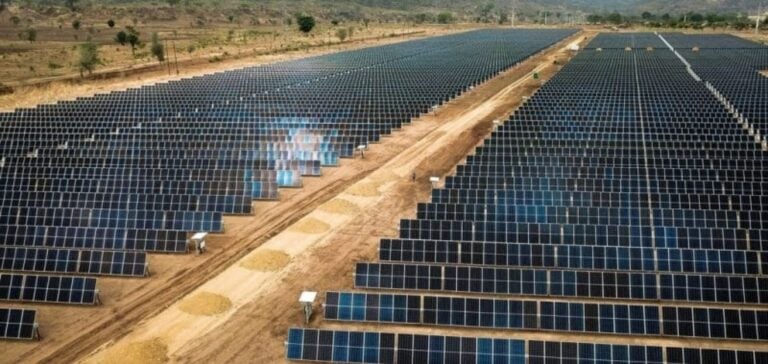NamPower, Namibia’s national electricity company, has signed a contract with China Jiangxi International Economic and Technical Cooperation Co.
Ltd and Chint New Energy Development (Zhejiang) Co.
Ltd for the construction of a 100 megawatt (MW) solar power plant.
This project is part of Namibia’s efforts to strengthen its domestic energy production and reduce its dependence on electricity imports from neighboring countries such as Zambia and South Africa.
The total investment for this solar power plant amounts to 1.4 billion Namibian dollars (approx. 78.33 million US dollars), 80% of which is being financed by KfW, a German development bank. NamPower is financing the balance from its own resources.
Construction, entrusted to Chinese companies, is scheduled to take 18 months, with commissioning scheduled for the second quarter of 2026.
NamPower’s strategic positioning
The addition of 100 MW to the current installed capacity of around 500 MW is a strategic move for NamPower, in a context of growing energy demand and pressure on electricity infrastructures.
The aim is to offer greater tariff stability and meet energy needs without relying heavily on imports.
The development of this solar power plant is part of the company’s strategy to diversify its energy mix and manage supply costs.
The terms of the contract also include training and skills transfer to Namibian personnel, reinforcing local expertise in the operation and maintenance of solar infrastructures.
Financial Challenges and the Energy Market
Financial support from KfW is crucial to the project’s success, but NamPower will need to carefully manage construction and operating costs to ensure long-term profitability.
The solar power plant could also play a role in NamPower’s electricity export strategy, should surplus production materialize.
The integration of this new capacity could redefine the regional energy landscape and position Namibia as a more autonomous player.
The use of Chinese companies for this project reflects a growing trend in the involvement of Chinese players in sub-Saharan Africa, particularly in the field of energy infrastructure.
This type of partnership can be seen as an opportunity to improve the resilience of Namibia’s energy sector.
Outlook for Energy Policy
This project is in line with Namibia’s ongoing energy reforms, aimed at modernizing the sector and attracting more private investment.
By increasing its local production capacity, Namibia aims to reduce its vulnerability to external shocks and stabilize its electricity supply.
Institutional players and investors are closely monitoring the progress of this project, which could serve as a model for future initiatives.






















